Meta, FADA Highlight Digital Transformation In Automotive Sector
- By MT Bureau
- January 21, 2025
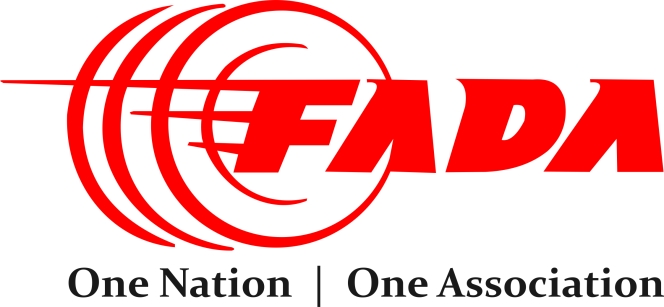
Meta and the Federation of Automobile Dealers Associations (FADA) have released a joint whitepaper and playbook detailing how digital adoption is reshaping consumer behaviour and preferences in India’s automotive sector. The report underscores how digitalisation is driving sector growth and offers strategies for transforming OEMs and dealerships nationwide.
In 2023, Meta and FADA launched the ‘Move with Meta’ programme, designed to upskill over 3,000 auto dealers across India. The initiative equips dealers with tools to enhance their social media presence, digitise customer engagement, and optimise lead generation through Meta platforms.
The programme has surpassed expectations, achieving a 3 times increase in dealer digitisation and training over 6,000 dealers through hyperlocal efforts, doubling its initial target. Combined with pre-programme efforts, a total of 10,000 dealers have now been upskilled.
Results have been significant, with a 32 percent improvement in lead generation efficiency reported by participants. The initiative has also contributed to improved sales performance for leading automotive OEMs across India, marking a major milestone in the sector’s digital evolution.
FADA President C S Vigneshwar said, “At FADA, our vision is to empower dealers nationwide with the right digital tools and insights to stay ahead in a rapidly evolving market. Through our partnership with Meta, we’ve not only exceeded our commitment of upskilling 3,000 dealers—surpassing 6,000—but we’ve also seen a 3 times increase in digitisation and a marked 32 percent improvement in lead generation efficiency. This whitepaper underscores the potential of AI, Reels, and messaging platforms such as WhatsApp to strengthen customer relationships and drive growth. We look forward to scaling this collaboration further, bridging the digital gap in automotive retail, ensuring that dealers across India are future-ready, and remain agile in these dynamic times.”
Director Auto, CPG and D2C for Meta in India Saugato Bhowmik said, “Our platforms and products are well positioned to enable rapid and efficient digital customer acquisition and engagement for auto dealers in a hyperlocal manner. Over the last two years we’ve upskilled nearly 10,000 dealers along with FADA to digitize their outreach and experiences through our unique hyperlocal solutions and key products ranging from Reels and AI to messaging. We’re thrilled to deepen our partnership with FADA and take on the ambitious target of upskilling 5000 more dealers in the next 2 years. This program has not only benefitted thousands of auto dealers but also proven to drive strong sales results for leading OEMs.”
Auto OEMs have reported strong sales and lead generation impact because of the program.
Group Head of Marketing at Hyundai Motor India Limited, Virat Khullar, said “We’re excited to see outstanding business results through our partnership with Meta and OnlineSales on the Hyperlocal program. Together, we’ve developed a custom model that efficiently onboarded over 600 dealers in record time. In H2 '24, Meta’s hyperlocal program drove a remarkable 37% growth in sales compared to H1, while delivering 29% reduction in Cost per Retail. As we move forward, we’re eager to scale this partnership further, leveraging cutting-edge AI and messaging solutions to unlock even greater opportunities.”
Chief Marketing Officer of Auto at Mahindra and Mahindra Limited, Manjari Upadhye, said “Our partnership with Meta has helped amplify the impact of our passenger vehicle launches. Mahindra has leveraged the best and latest in technology to drive launch impact through Meta’s family of Apps. Some of the key activations include leveraging WhatsApp for Thar ROXX launch, using Partnership ads for driving consideration for XUV 700 (Intent went up +3.3 pts) and the Auto Industry’s first chat-based car configurator on Messenger and Instagram Direct for XUV 3XO, which saw 29% increase in conversation volumes. Our collaboration with Meta has driven significant impact, leading to bookings and sales, and setting new benchmarks in the industry.”
Key Insights from the Auto Playbook 2025
Meta’s influence in driving discovery & evaluation, powered by AI: 72 percent of new automotive buyers who were surveyed in this research discovered the brand on the Meta family of apps. Further, 69 percent stated that the Meta family of apps played a role in their purchase decision.
WhatsApp Leads Buyer-Dealer Communication: Among new automobile buyers, 48 percent used WhatsApp to directly connect with dealerships for vehicle availability inquiries, making it the most preferred communication channel. Moreover, 47 percent expressed interest in receiving service reminders via messaging platforms.
Advantage+ Placements Revolutionizing Advertising: To improve cost per lead and lead volume by Meta for their Hyperlocal dealer campaigns, Hyundai India, used AI-powered Advantage+ Placements to place their dealer ads across all Meta surfaces. They saw 18 percent an increase in Lead Volume and 34 percent decrease in Cost Per Lead.
Reels and Creator Content Drive Purchase Decisions: 72 percent of automotive buyers find creator content on Instagram Reels helpful for vehicle evaluation, with 41 percent regularly engaging with vehicle-related Reels. By partnering with creators, dealers can build authenticity and amplify their reach.
Maruti Suzuki India Plots INR 49.6 Billion Investment For New Manufacturing Plant In Gujarat
- By MT Bureau
- January 13, 2026
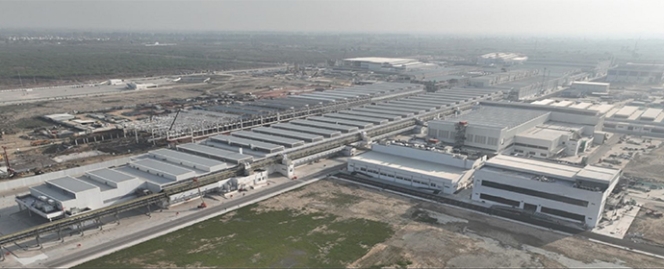
Maruti Suzuki India, a subsidiary of Suzuki Motor Corporation and the country’s largest passenger vehicle manufacturer, has announced that it is set to acquire land from the Government of Gujarat for the construction of a new production facility.
The decision follows a basic agreement reached with the state government in January 2024 to establish a second manufacturing base in the region.
The site in Sanand covers approximately 1,750 acres valued at INR 49.6 billion. Once operational, the facility is expected to have an annual production capacity of 1 million units.
The company cited Gujarat’s supply chain, infrastructure and proximity to ports as factors for the selection. The location provides access to highway and railway networks, supporting its function as both a domestic production base and an export hub for vehicles.
Current and Planned Production Capacity
|
Plant Location |
Start of Operations |
Site Area (m²) |
Annual Capacity (Units) |
|
Gurgaon (Haryana) |
1983 |
1.2 million |
700,000 |
|
Manesar (Haryana) |
2006 |
2.4 million |
900,000 |
|
Hansalpur (Gujarat) |
2017 |
2.6 million |
750,000 |
|
Kharkhoda (Haryana) |
2025 |
3.24 million |
250,000 |
|
Sanand (Gujarat) |
TBD |
7 million |
1,000,000 |
- Ashok Leyland
- Hinduja Group
- Yogi Adityanath
- Rajnath Singh
- H D Kumaraswamy
- Dheeraj Hinduja
- Shenu Agarwal
Ashok Leyland Inaugurates Greenfield Manufacturing Facility In Lucknow
- By MT Bureau
- January 09, 2026
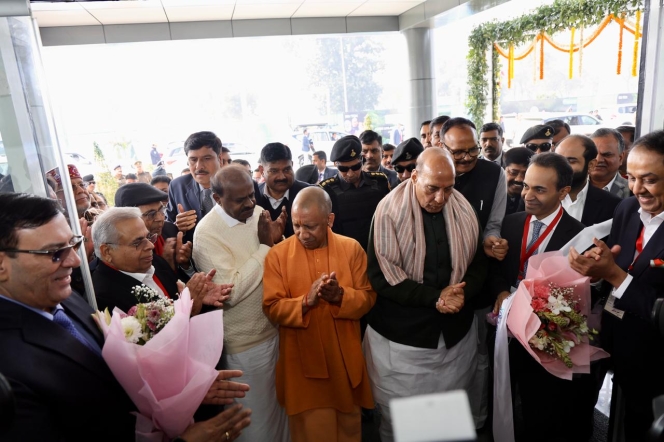
Ashok Leyland, one of the leading commercial vehicle manufacturers in the country, has opened a new integrated manufacturing facility in Lucknow, Uttar Pradesh.
The greenfield facility, located near Lucknow Airport in Sarojini Nagar, was inaugurated by Yogi Adityanath, Chief Minister of Uttar Pradesh, alongside Union Ministers Rajnath Singh and H D Kumaraswamy.
The 70-acre site is designed to produce 5,000 vehicles annually, with a primary focus on electric buses and other green mobility solutions. The facility employs a workforce predominantly from Uttar Pradesh, including a high percentage of women. To support its sustainability goals, the plant features rooftop solar panels, energy-efficient lighting and zero-discharge water systems.
Dheeraj Hinduja, Chairman, Ashok Leyland, said, "The inauguration of this new plant marks the beginning of an important new chapter for Ashok Leyland in the vibrant state of Uttar Pradesh. Our Group remains deeply committed to unlocking further opportunities that drive economic growth, create meaningful employment, and foster long-term prosperity in the region. This manufacturing plant reaffirms our resolve to help shape the future of India’s commercial vehicle industry, and we are confident that it will make a strong contribution towards employment generation while advancing sustainable mobility. With this new plant, we are preparing ourselves for the future and take one step further to achieve our Net Zero emission goals."
Shenu Agarwal, MD & CEO, Ashok Leyland, said, "As one of India’s largest and most progressive states, Uttar Pradesh has demonstrated a strong and consistent commitment to environmental responsibility and sustainable development, making it a natural partner in our green mobility journey. This coupled with Ashok Leyland’s ambition to achieve Net Zero by 2048 has been a key catalyst for establishing this state-of-the-art facility in Uttar Pradesh. Equipped with most modern technology and high levels of automation, the plant reflects our focus on world-class quality and innovation. With a strong emphasis on electric buses, this facility marks a significant step towards building a cleaner, future-ready mobility ecosystem for India.”
The plant's logistics are managed using battery-operated vehicles to maintain its status as a green facility. This expansion aligns with Ashok Leyland's target to reach Net Zero emissions by 2048 and supports the state of Uttar Pradesh's transition toward electric transportation.
Bharat Forge And Agile Robots Ink MoU For AI Industrial Automation
- By MT Bureau
- January 09, 2026
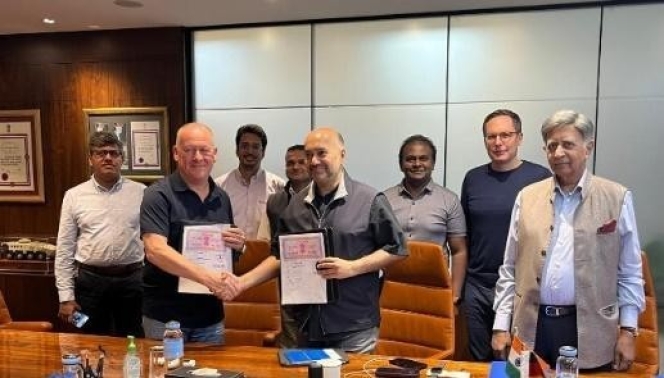
Bharat Forge and Germany-based Agile Robots have agreed to explore a collaboration to develop AI-driven robotics and industrial automation. The partnership combines Bharat Forge's domain expertise with Agile Robots' automation solutions to deploy technology for the automotive, healthcare, and consumer electronics industries.
The agreement focuses on civilian industry and manufacturing. Under the Memorandum of Understanding (MoU), the companies will co-develop and offer solutions in manufacturing, industrial CPG and logistics for markets in India and Southeast Asia. The partnership also aims to develop vision and AI-based robotic systems to enable autonomous ‘dark’ factories.
Amit Kalyani, Vice-Chairman and Joint Managing Director, Bharat Forge, said, “This strategic collaboration with Agile Robots is a reinforcement of Bharat Forge’s ambition to provide state-of-the-art intelligent robotic and automation solutions across multiple industries while driving manufacturing efficiencies at home. Manufacturing in India is on a steep growth path, and I am very excited that with Agile Robots we are going to deploy bespoke, modular and intelligent automation solutions across the sectors.”
Rory Sexton, Executive Director, Agile Robots, said, “By partnering with Bharat Forge, Agile Robots is strengthening its position in India's rapidly growing manufacturing sector. Combining Agile Robots’ proven leadership in AI driven robotic automation with Bharat Forge’s sectoral expertise will allow us to improve the efficiency and precision of entire production systems.”
The collaboration intends to set up capabilities for bespoke solutions while utilizing existing Agile Robots technology. By integrating AI into production systems, the companies aim to improve precision and efficiency across manufacturing sectors in the region.
Hindustan Zinc, Silox India Strengthen Partnership For Low-Carbon Manufacturing
- By MT Bureau
- January 07, 2026
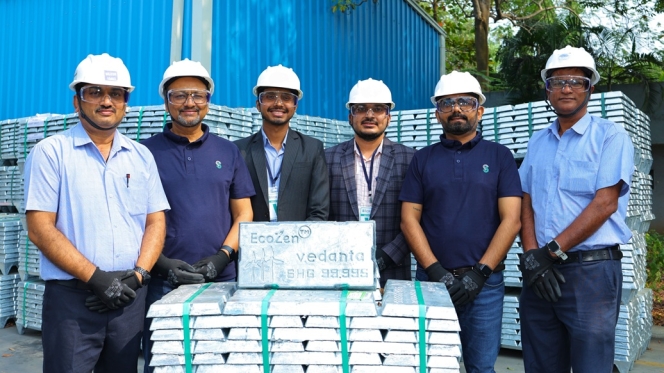
Hindustan Zinc and Silox India have expanded their long-term collaboration to focus on industrial decarbonisation and the development of sustainable supply chains. As part of the agreement, Silox India has adopted EcoZen, a low-carbon zinc brand produced by Hindustan Zinc, for use across its manufacturing operations. This integration is intended to reduce the carbon footprint of zinc-based chemical products while maintaining existing quality standards.
EcoZen is manufactured using renewable energy and has a verified carbon footprint of less than one tonne of CO2 per tonne of zinc. According to the company, this is approximately 75 percent lower than the global industry average. The material offers full traceability, allowing downstream users to account for the environmental impact of their inputs. When used in galvanising, EcoZen can prevent approximately 400 kilograms of CO2 emissions per tonne of steel compared to conventional zinc.
Hindustan Zinc, a Vedanta Group company, supplies materials to various sectors including infrastructure, automotive and renewables. The company is a member of the International Council on Mining and Metals (ICMM) and has prioritised the reduction of Scope 3 emissions for its clients. Silox India, which specialises in inorganic chemistry and non-ferrous metal derivatives, will use EcoZen to support its environmental, social, and governance (ESG) targets.
Arun Misra, Chief Executive Officer & Whole-time Director, Hindustan Zinc, said, “Decarbonisation at Hindustan Zinc is not limited to our own operations; it extends to how our products are used across industries. EcoZen represents a step change in how zinc can support cleaner manufacturing. By partnering with customers like Silox India, we are enabling the wider adoption of low-carbon solutions at scale.”
Prakash Raman, Managing Director, Silox India, said, “Integrating EcoZen into our manufacturing processes allows us to lower embedded emissions across our product portfolio while continuing to deliver high-performance solutions to our customers. This partnership demonstrates how upstream innovation can accelerate sustainability outcomes downstream.”
The partnership aligns with the increasing demand for low-carbon materials in the automotive and infrastructure sectors. EcoZen is supported by life-cycle assessments and globally recognised ISO and REACH certifications to ensure transparency and compliance with environmental regulations.



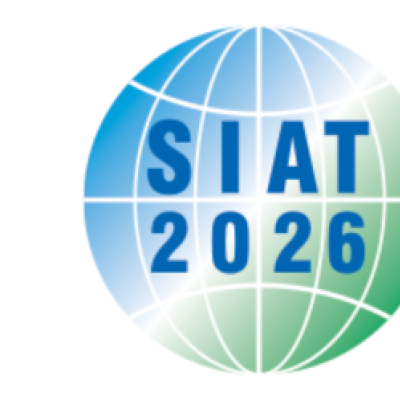



Comments (0)
ADD COMMENT